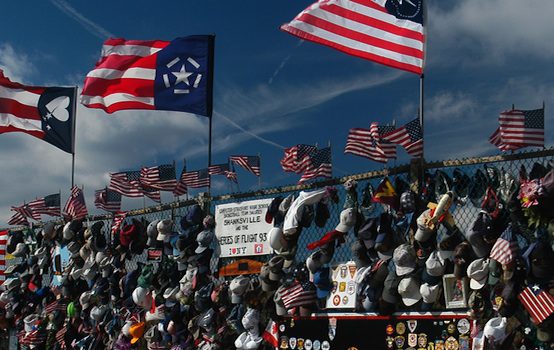Remembering the Heroes of Flight 93

It’s often noted that the morning of September 11, 2001 was idyllic. The weather in New York City was beautiful that late summer morning, 16 years ago, drenched in sunlight, humidity wafting away by a slight caressing breeze. It was the kind of perfect day that makes one think that all is good—one more bright, lovely gift before the leaves begin to turn and the season begins its change.
And then came the maelstrom.
There is no denying the darkness of that day. But however acute, this despair is not the story of 9/11. The immediate emergency response, and the steady efforts of those in the days to follow to care for the injured, search for the dead, and begin the Herculean tasks of cleanup and rebuilding, reminded us of who we are as Americans. Some of our most admirable qualities were on full display: our resourcefulness, our compassion, our national pride.
For sixteen years now, we have celebrated and given thanks to those men and women who responded to evil in this way.
They are American heroes.
As the full scope of the tragedy came into focus with the passage of the hours, we learned about still other heroes, whose signature act was hidden initially by the confusion of the day, but whose deeds in time became legendary. These were the men and women aboard United Flight 93.
Their plane was delayed in takeoff by almost an hour due to airport traffic. Because of the delay, the forty passengers and crew members aboard were able in the minutes after it was hijacked to discover what had happened in Manhattan and in Washington D.C., while making cell phone calls to family and friends. They were horrified when they put the pieces together, as United 93 turned over Ohio to start back eastward. They were told by the hijackers that it would be best if they did nothing. Over the intercom, they heard the command in broken English: “Sit down, keep remaining seating…We have a bomb on board. So sit.”
But they knew what their attackers intended to do. The World Trade Center and the Pentagon were not randomly selected targets. They are symbols of American strength, American enterprise, the American spirit. Terrorism works this way. The passengers on Flight 93 guessed the hijackers of their plane were aiming for a similarly symbolic target. They gauged the magnitude of that intention and the unspeakable damage that fate would entail, both human and symbolic. And so, they did not sit down.
They stood up, and they put together a plan to resist the terrorists and thwart their designs.
Tom Burnett was one of the four men who spearheaded the effort to retake the plane. He had several conversations with his wife Deena that span the time from the hijack to mere minutes before the plane struck ground.
In the last of these calls, Deena told him of the strike on the Pentagon; she had earlier informed him that the World Trade Center had been hit. “It’s a suicide mission,” he immediately guessed. “We have to do something. I’m putting a plan together with several people,” he said. He told her they were waiting until the plane was over a rural area, at which point they would attempt to take it back from the hijackers. Her reaction was instinctively protective: “No!,” she emphatically responded. “Sit down! Don’t draw attention to yourself!” Tom told Deena to pray, adding: “Don’t worry, Deena. I’ll be home for dinner. I may be late, but I’ll be home.”
When I first read these words in Deena Burnett’s remarkable book about her husband’s life and death, I paused a moment, unsure that I had read the passage correctly. In the face of horror, in a hijacked plane flying at 40,000 feet on a suicide terror mission, he says these words? Not a hint of fear or despair. Unflappable. Confident. Supremely clear of vision and purpose, even while gazing on chaos itself.
This is what real heroes sound like. Those words have stayed with me all these years. They give me confidence, and they give me purpose, and they make me proud of this, my country, Tom Burnett’s country.
I have been many times to the field in Shanksville where the plane crashed. It is a moving experience, every time, without fail. My friend, the late Father Alphonse Mascherino, who created the Flight 93 Memorial Chapel a few miles from the crash site, used to tell rapt congregations gathered there what it was that gave this simple Pennsylvania field its power: “What did you expect to find here?” he would ask them, “It’s just an empty field. Except in this field, heroes died.”
A great scholar of human culture once defined the hero in this way: “A hero is like the living symbol of a society. When a society takes consciousness of itself through its heroes, it feels that it takes its origins, its blood, its name from the prestige of their authority, their strength and their worth.” The heroes of Flight 93 offer us a vision of who we are at our best: courageous, self-determined, honorable.
We must not forget these heroes. We must refuse to allow the mundane concerns of life, pleasantly distracting as they undoubtedly are, and the passage of the years, to wash their memory away. We must remember these men and women whose bodies lie shattered in that field because they, who began September 11, 2001 as ordinary citizens, were transformed in the course of events into great heroes of our nation.
Alexander Riley is the author of Angel Patriots: The Crash of United Flight 93 and the Myth of America.
Comments